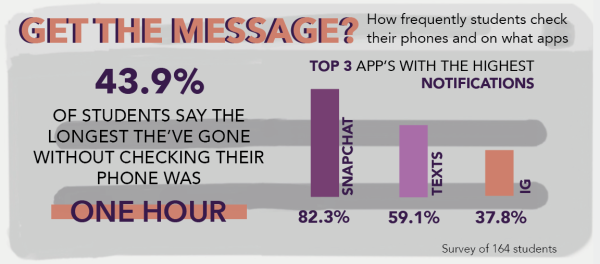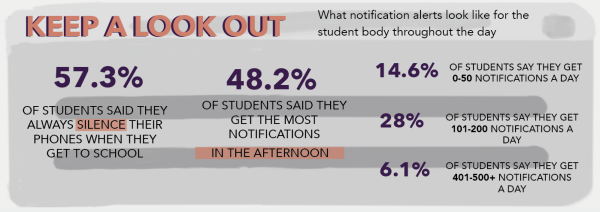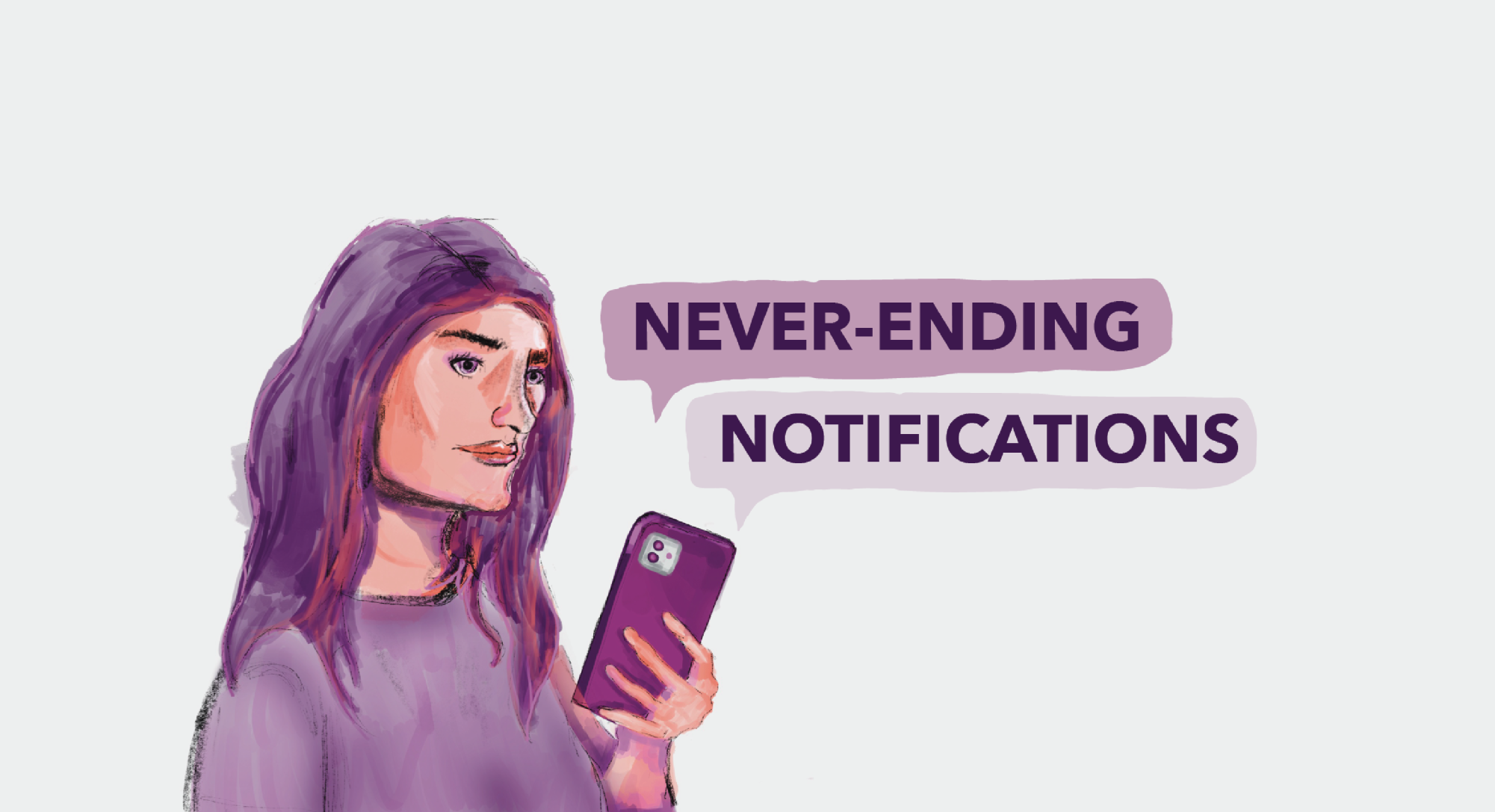Read the signs

Students have been hearing about the harms of screen time for years, but many aren’t aware of the impact notifications alone can have. Recent studies published by CNN show that a constant barrage of notifications have negative effects on teens. The 2023 study, conducted by Common Sense Media, showed that the 200 11-to-17-year-old participants checked their phones 100 times a day on average, with many feeling as if they were unable to put them down. Researchers taking part in the study concluded that the addictive algorithms of many popular social media apps, like TikTok, were to blame. The study found that excessive phone use is closely tied to the pressure to respond to notifications including not just friends and family, but notifications of tragic events worldwide. Ultimately, the increase in phone use from notifications led to increases in anxiety in the participants.
What’s the problem?
According to the study conducted by Common Sense Media, teens receive more than 20% of all notifications during the school day, which can number in the hundreds.
With two-thirds of study participants saying phone usage helped relieve negative feelings, it’s no surprise that students are glued to the screen. For sophomore Callaway Clifton, her phone can be a welcome reprieve.
“[Checking my phone] gets my mind off of things like school,” Clifton said. “Just the amount of work can be too much to think about.”
Similarly, sophomore Elyott Edwards finds comfort in scrolling on his phone during the stress of coping with school work and other responsibilities.
“[I go on] TikTok just to cope,” Edwards said. “It makes me stop thinking, which is incredibly unhealthy and I know that, but I’d rather think about that than whatever is stressing me out.”
For many, the attraction of phones can make it difficult to maintain focus amidst so many things calling for attention. Sophomore Paige Roth has found that notifications can severely disrupt her focus.
“When I’m focused and I get a notification, it makes me go off track and I start to lose focus,” Roth said. “It’s definitely a struggle because once I get off track I have to realize what I’m doing in order to get back on track, which can be hard.”
According to many teachers, notifications are often the starting point for distraction during class, even just a quick check. Math teacher Sarah Sides attests to this.
“I think that it’s hard to do a quick check,” Sides said. “That check leads to something else, and then something else, and then you end up wasting 10 minutes that you wouldn’t have wasted if you didn’t have your phone at your fingertips.”
Many students, such as Sophomore Nathaniel Petrowsky, have experienced the phenomena that Sides described with apps like TikTok, which have highly personalized algorithms. According to the aforementioned study, TikTok was the longest-duration app used by participants at two hours on an average day, but ranging to over seven hours.
“I check my phone every five or 10 minutes or when I get a notification,” Petrowsky said. “If I click on a TikTok notification, I’m there for hours, it’s just such a big waste of time.”
However, many students may not be aware of just how much they check their phones. School psychologist Stacy Miller states that this can lead to huge amounts of screen time.
“It’s really interesting because you feel like “Oh, I don’t look at my phone that much,” but you do, everyone does,” Miller said. “I think that the average is seven hours a day that we look at our phones. That’s a lot of time. Of the time that you’re not asleep, that’s almost half your day that you’re checking your phone.”
Science teacher Eric Thomas, who limits phone usage in his classes, believes that the issue of notifications is even more recognizable now than it has been in the past.
“I really think that we’re coming to a point where students know they have a problem,” Thomas said. “If you were to ask maybe five or six years ago, it would be a little bit different, but I think now students are like “no, I really do need somebody to tell me to put away my phone otherwise I can hardly function.’”
It’s not just functioning within school that is the problem. According to Miller, the constant influx of notifications from emails, Canvas or Skyward can lead to unbalanced lives, even for adults.
“A big thing for adults is the work and leisure boundaries,” Miller said. “It’s almost like we don’t have a clear boundary between our work life and our leisure life, they’re constantly bleeding into each other. Work is carrying over into home and we’re not having that separation.”
This lack of separation can be very frustrating for students and teachers alike. According to Roth, there is an element of stress associated with the constant expectation to socialize.
“Sometimes I think [getting notifications] just stresses me out because I don’t want to have to think about responses,” Roth said. “I don’t want to have to think about how my words could affect people, so getting those notifications and having to respond stresses me out.”

Response time
One of the main roadblocks to staying off phones is that it can be a struggle to mentally and emotionally differentiate between important and unimportant notifications.
According to senior Ellee Wheelock, it can be difficult to resist the temptation to check her phone with each notification.
“It’s definitely hard to ignore my phone when I’m getting notifications and I want to constantly check it, but so I’ve kind of learned to just ignore them,” Wheelock said.
In her career, Miller has found that anticipating messages or notifications can lead to distraction for students at school and at home.
“It’s easy to want to know what that buzz was or the vibration of your watch or whatever it may be,” Miller said. “If something’s going on and your friends are contacting you, it’s hard to have focused attention on school and your tasks.”
This is true for senior Kai Hayes, who has felt overwhelmed by the number of notifications he received at once, especially if they are school-related.
“There’s just too many notifications and [my phone] is constantly buzzing so I just have to use the Do not Disturb feature,” Hayes said. “[There’s more pressure] if it’s something for drumline and a bunch of people are sending messages or something that’s important.”
According to a JagWire survey of 164 students, 53.1% of students cannot go over one hour without checking their phone. Roth explains that for her it can be stressful to be away from her phone for long periods of time.
“It stresses me out because I feel like I’m missing out on something important,” Roth said. “If somebody needs something from me, I can’t get back to them.”
With most notifications setting off the same sound, it can be hard to determine the actual urgency of a notification.
“I think that there’s always an urgency of “Does my friend need me? Does my mom need me?’” Miller said. “It makes me feel better if I’m that person that’s always responding and helping.”
Even when it doesn’t result in opening the phone, notifications encourage heavy attachment to the device. Wheelock said that she checks her phone for new notifications every five minutes.
“I’ll check my phone but sometimes I don’t answer [my notifications],” Wheelock said. “I’ll still see who it is and I always check [that].”
For Clifton, seeing so many names flash across the screen can cause important notifications to get lost in the flood.
“Usually I’ll [pick up my phone] for iMessage and texts because they’re more important, I think,” Clifton said. “They are usually from more important people like my parents who might need me to respond quickly.”
These kinds of constant notifications can be stressful for many students. For Roth, the buzzing of her phone can upset her mood when she is trying to take time for herself.
“Sometimes if I’m not in a social mood and I get a whole bunch of notifications it just makes me mad,” Roth said. “When I’m trying to listen to music and my airpods tell me I got a notification, that’s when I get mad.”
Similarly, Edwards feels overwhelmed being constantly pulled back into his phone by notifications.
“Too many notifications feel like someone’s tugging on your arm, it feels like someone is demanding your attention,” Edwards said. “I don’t know why, like just a couple texts don’t feel like that, but if I have 20 texts, it feels like everyone is trying to rip me apart.”
Miller understands the difficulty of maintaining a healthy relationship with notifications in a society that relies heavily on instant replies.
“Our world is not designed to have a separation from our phones anymore,” Miller said. “We do so many things on them and they can be really useful. There has to be a good balance of when you can use them and when you should not so that you can be engaged in the lesson or activity.”
Check yourself, not your phone
Reaching a good technology balance can be difficult when social media apps are designed to pull users in.
For some students like Wheelock, the Do not Disturb feature has been a useful tool in limiting how much she checks her phone.
“I use [Do not Disturb] during tests and then at night,” Wheelock said. “If I know I need to focus then I like to make myself not check [my phone].”
Similarly, Miller advocates for the usage of do not disturb features to avoid the buzz of notifications while she is trying to sleep.
“I use sleep mode at night, and so it turns my phone and all my notifications off so I don’t get any phone calls or messages,” Miller said.
It can be hard to get into these habits. For Edwards, shutting off all notifications can be just as stressful as being flooded with them.
“I don’t [use Do not Disturb] just because I’m always afraid that something’s going to be urgent and then I’m going to miss it,” Edwards said.
To avoid this anxiety, some students limit notifications on just the most distracting apps, like Roth has done with TikTok.
“I turn on my Do Not Disturb on my phone during tests,” Roth said. “For Tik Tok I don’t even have notifications turned on cause I don’t need another reason to open the app.”
Additionally many apps have features that enforce time limits on that app exclusively, which can be set by the owner. This is one of many ways that Miller suggests to prevent getting sucked in by notifications.
“You can set limits within an app,” Miller said. “You can go into Instagram and say “I only want to use it for 30 minutes a day” and it can set some time limits, which can be super helpful.”
Taking a break from the phone altogether can also help improve general focus. While reading, drawing or other activities can help, Miller attests that simply staying off your phone during quality time has its benefits.
“Having a tech free evening with your friends can be really healthy and healing to create some space and boundaries,” Miller said. “You have to remind yourself that there are times that you have to be truly engaged and not interrupted.”
In the end, phones can be an excellent tool for socialization and communication, but teens have to recognize when that vibration begins to interfere in their lives, according to Thomas.
“I think the phone is a tool, just like anything else, but I think it’s a tool that can dominate you,” Thomas said. “When that starts to happen, I think you just have to put away your phone.”











